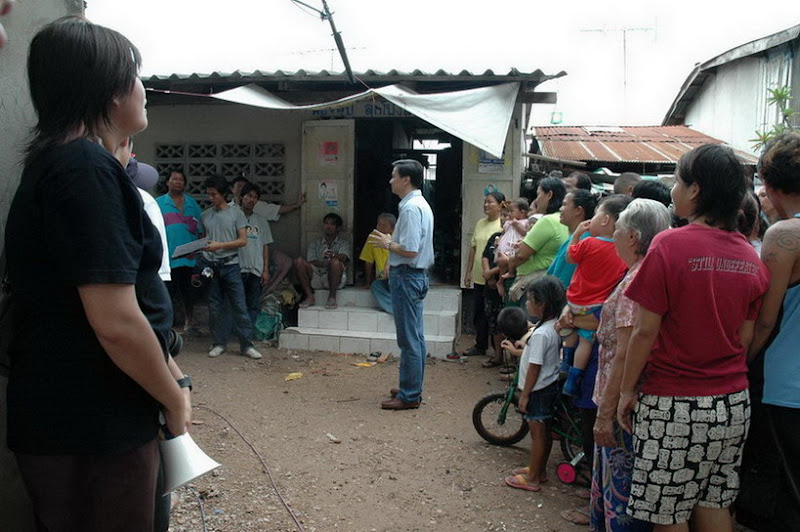
Abhisit Vejjajiva — a patrician 44-year-old with an Oxford education — became Thailand's prime minister on Monday amid hopes that he can calm the political storms that have battered the country for the past three years.
But untested at the pinnacle of power and said to lack decisiveness, he could face one of the roughest rides in modern Thai history.
Abhisit, who heads the former opposition Democrat Party, defeated a loyalist of exiled but still powerful ex-Prime Minister Thaksin Shinawatra in a parliamentary vote. The parliamentary contest came in the wake of mass protests by anti-Thaksin forces that included a weeklong siege of Bangkok's airports.

Now, Abhisit must try to neutralize Thaksin's supporters, who have vowed to take to the streets themselves, grapple with a dramatic economic downturn and keep intact the fragile coalition of small parties that brought him to power.
"Abhisit is untested and that is both good and bad. He has a clean record. He is well-educated, eloquent and principled so the public will likely give him a chance," says Panithan Wattanayagorn, a political scientist at Bangkok's Chulalongkorn University.

But Panithan said Abhisit has yet to outline a bold solution to Thailand's manifold problems.
"That is his weakness and that lack of decisiveness and clear political stance could turn against him very quickly," he said. "It's going to be among Thailand's roughest premierships."
Abhisit, who entered politics at the age of 27, lost his chance for the job in 2007, when the Democrats failed to win over the rural masses in general elections.
 |
| From Abhisit Vejjajiva : Prime Minister of Thailand : Shooting TV Commercial with Sky Exits Films Bangkok |
From a wealthy family of Thai-Chinese origin, Abhisit was born in England and educated at Eton and Oxford, where he earned an honors degree in philosophy, politics and economics. His first name means "privilege" in Thai and his friends call him by his foreign nickname, Mark.
He joined the country's oldest party, the Democrats, in 1992 and became one of the youngest ever members of Parliament. He rose in the party ranks and in popularity, especially among the educated in Bangkok who took to his clean record, polite demeanor, articulate if somewhat bland speeches and movie-star looks.
Abhisit assumed the party's leadership in 2005 and a year later the Democrats boycotted elections called by Thaksin, accusing the prime minister of calling the vote to divert public attention from scandals and corruption allegations against him.

Thaksin's party won, but he was toppled in a military coup later that year. However, his allies remained strong and their new People Power Party defeated Abhisit's Democrats in December 2007 elections.
During the ensuing political turmoil, the Democrat Party voiced support for the main anti-government movement, the People's Alliance for Democracy, but held back from joining the sometimes-violent street demonstrations.
In recent years, the party has maintained its strongholds in Bangkok and southern Thailand but made little inroads into the populous, poor northeast, where elections are normally won or lost, often through massive vote-buying.
Many Thais, especially in the countryside, favor earthy, charismatic politicians. Abhisit, who counts "Myth of Sisyphus" by French existential novelist Albert Camus among his favorite books, lacks such grit.
Thaksin, by contrast, used to travel through the countryside, speaking the farmers' language and listening to their hardships.
"It's very difficult to imagine Abhisit in that same kind of performance with the same kind of results. He's a rather cool character. Thaksin is hot and open," said Chris Baker, a political scientist at Bangkok's Chulalongkorn University. "Of course he (Abhisit) can change. Power changes people enormously."
The rural-urban divide, which in large measure led to the current crisis, was clearly evident in reactions to Abhisit's victory.
"This is very bad for poor people. Abhisit was born with silver spoons and forks in his mouth. He knows nothing but wealth and privilege. How could he solve our problems?" said Chaiya Paitoonsiri, a taxi driver from the impoverished northeastern province of Maha Sarakam.
But a 26-year-old office worker in Bangkok, Nutta Tangtrakulchai, said, "It's nice to have someone smart for a change. He is also an economist so he should be savvy about solving the country's most important problem."
Credit Link; http://www.sfgate.com/cgi-bin/article.cgi?f=/n/a/2008/12/15/international/i044440S85.DTL&type=politics
Slide Show:



































































































No comments:
Post a Comment